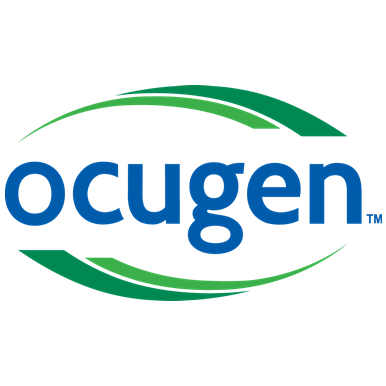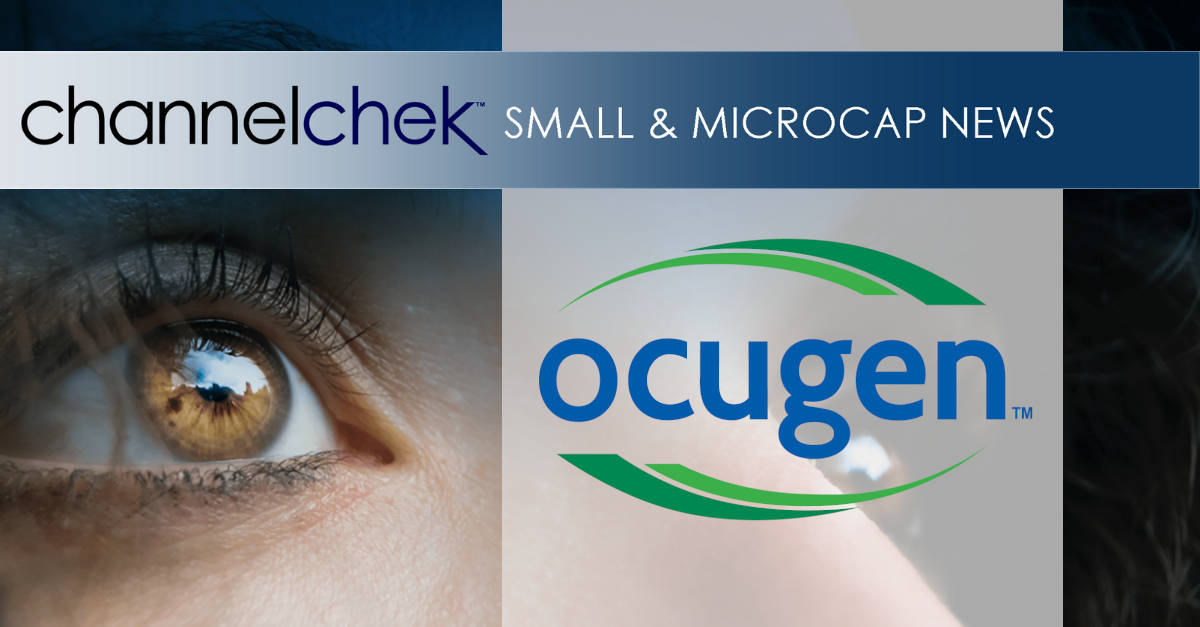
Research News and Market Data on OCGN
January 13, 2025
- 100% (9/9) of treated evaluable subjects demonstrated improvement or preservation in visual function compared to untreated eyes at both one and two years
- 100% (9/9) of treated evaluable subjects demonstrated improvement or stabilization in mobility testing, which was only performed up to one year
- Improvement in visual function was statistically significant (p=0.01, treated vs untreated eyes), regardless of mutation at two years
- Favorable long-term safety and tolerability profile with no serious adverse events related to OCU400
MALVERN, Pa., Jan. 13, 2025 (GLOBE NEWSWIRE) — Ocugen, Inc. (“Ocugen” or the “Company”) (NASDAQ: OCGN), a biotechnology company focused on discovering, developing, and commercializing novel gene and cell therapies, biologics, and vaccines, today announced a positive 2-year safety and efficacy update for the Phase 1/2 OCU400 clinical trial. OCU400 is intended for the treatment of early to advanced retinitis pigmentosa (RP) in pediatric and adult populations. Currently, about 2 million patients globally (~300,000 in U.S./EU) desperately need rescue, otherwise they can potentially become legally blind at some point in their life. OCU400 is intended to treat all these patients with a one-time therapy.
OCU400 demonstrated meaningful improvement of 2-line gain (10 letters on ETDRS chart) in low-luminance visual acuity (LLVA) in treated eyes when compared to untreated fellow eyes. This treatment effect was statistically significant (p=0.01) in all subjects, regardless of mutation at two years, validating the gene-agnostic mechanism of action for OCU400.
This data highlights the unique therapeutic potential of OCU400. To date, Ocugen’s groundbreaking modifier gene therapy platform provides long-term safety and meaningful improvements in visual function for patients suffering from RP—a condition that leads to progressive vision loss.
“We are thrilled to share these compelling results from the Phase 1/2 OCU400 trial,” said Shankar Musunuri, PhD, MBA, Chairman, CEO, and Co-Founder of Ocugen. “These findings represent a significant step forward in our mission to bring life-changing therapies to patients with inherited retinal disorders and confirm the transformative potential of our modifier gene therapy platform.”
“It is truly remarkable to see the significant improvements in visual acuity in patients treated with OCU400 sustained at two years,” said Syed M. Shah, MD, FACS, Vice Chair for Research and Digital Medicine, Director of Retina Service at Gundersen Health System, La Crosse, Wisconsin. “The broad spectrum of genes and mutations causing RP presents a unique challenge in developing treatments for this unmet need. This is where the promise of mutation-agnostic therapies becomes particularly compelling. OCU400’s demonstrated effectiveness across multiple mutations not only offers hope to RP patients but also opens new possibilities for treating other retinal diseases.”
“Establishing the long-term safety and efficacy of OCU400 demonstrates the durability of this novel gene therapy,” said Huma Qamar, MD, MPH, Chief Medical Officer at Ocugen. “These 2 year low light visual acuity (LLVA) findings, which are the most sensitive measure of visual function, are consistent with the results observed at one year.”
The Phase 3 OCU400 liMeliGhT clinical trial is currently ongoing and on target for BLA submission in the first half of 2026.
About OCU400
OCU400 is the Company’s modifier gene therapy product based on a nuclear hormone receptor (NHR) gene called NR2E3. This gene regulates diverse physiological functions within the retina, such as photoreceptor development and maintenance, metabolism, phototransduction, inflammation, and cell survival. Retinal cells in RP patients have a dysfunctional gene network, and OCU400 resets this network to reestablish a healthy cellular homeostasis—which has the potential to improve vision in patients with RP.
About Modifier Gene Therapy
Modifier gene therapy is designed to fulfill unmet medical needs related to retinal diseases, including IRDs, such as RP and Stargardt disease, as well as multifactorial diseases like dry age-related macular degeneration (dAMD). Our modifier gene therapy platform is based on the use of NHRs, master gene regulators, which have the potential to restore homeostasis—the basic biological processes in the retina. Unlike single-gene replacement therapies, which only target one genetic mutation, we believe that our modifier gene therapy platform, through its use of NHRs, represents a novel approach that has the potential to address multiple retinal diseases caused by mutations in multiple genes with one product, and to address complex diseases that are potentially caused by imbalances in multiple gene networks. Currently, Ocugen has three modifier gene therapy programs in the clinic: OCU400, OCU410, and OCU410ST. In addition to the OCU400 Phase 3 liMeliGhT clinical trial, the OCU410 Phase 1/2 ArMaDa clinical trial for geographic atrophy (GA) secondary to dAMD and the OCU410ST Phase 1/2 GARDian clinical trial for Stargardt disease are currently underway. GA affects approximately two to three million people in the U.S. and EU combined, and Stargardt disease affects nearly 100,000 people in the U.S. and EU combined.
About Ocugen, Inc.
Ocugen, Inc. is a biotechnology company focused on discovering, developing, and commercializing novel gene and cell therapies and vaccines that improve health and offer hope for patients across the globe. We are making an impact on patients’ lives through courageous innovation—forging new scientific paths that harness our unique intellectual and human capital. Our breakthrough modifier gene therapy platform has the potential to treat multiple retinal diseases with a single product, and we are advancing research in infectious diseases to support public health and orthopedic diseases to address unmet medical needs. Discover more at www.ocugen.com and follow us on X and LinkedIn.
Cautionary Note on Forward-Looking Statements
This press release contains forward-looking statements within the meaning of The Private Securities Litigation Reform Act of 1995, including, but not limited to, statements regarding qualitative assessments of available data, potential benefits, expectations for ongoing clinical trials, anticipated regulatory filings and anticipated development timelines, which are subject to risks and uncertainties. We may, in some cases, use terms such as “predicts,” “believes,” “potential,” “proposed,” “continue,” “estimates,” “anticipates,” “expects,” “plans,” “intends,” “may,” “could,” “might,” “will,” “should,” or other words that convey uncertainty of future events or outcomes to identify these forward-looking statements. Such statements are subject to numerous important factors, risks, and uncertainties that may cause actual events or results to differ materially from our current expectations, including, but not limited to, the risks that preliminary, interim and top-line clinical trial results may not be indicative of, and may differ from, final clinical data; the ability of OCU400 to perform in humans in a manner consistent with nonclinical, preclinical or previous clinical study data; that unfavorable new clinical trial data may emerge in ongoing clinical trials or through further analyses of existing clinical trial data; that earlier non-clinical and clinical data and testing of may not be predictive of the results or success of later clinical trials; and that that clinical trial data are subject to differing interpretations and assessments, including by regulatory authorities. These and other risks and uncertainties are more fully described in our periodic filings with the Securities and Exchange Commission (SEC), including the risk factors described in the section entitled “Risk Factors” in the quarterly and annual reports that we file with the SEC. Any forward-looking statements that we make in this press release speak only as of the date of this press release. Except as required by law, we assume no obligation to update forward-looking statements contained in this press release whether as a result of new information, future events, or otherwise, after the date of this press release.
Contact:
Tiffany Hamilton
Head of Corporate Communications
Tiffany.Hamilton@ocugen.com
